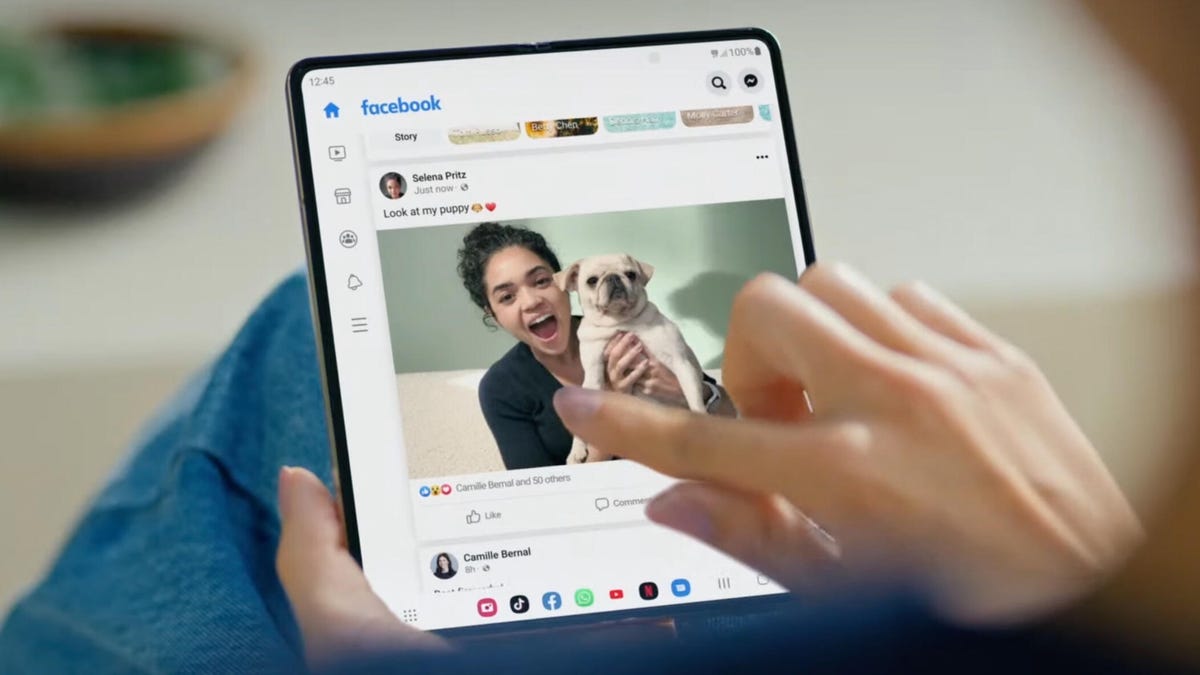
At its Unpacked event on Wednesday, Samsung unveiled its new flagship Galaxy Z Fold 4 phone, which brought better multitasking software, a slimmer design and a more durable body. But one thing left unchanged is the jaw-dropping $1,800 price tag -- an amount few consumers can stomach. But that exclusivity is exactly why the Fold 4 exists.
It may seem perplexing to keep the Z Fold 4 at about twice the price of other premium phones when Samsung wants foldables to become more mainstream, as CEO TM Roh said during Unpacked. I argued that price cuts would be the best way Samsung could combat Apple this holiday season. With Samsung holding steady with the Z Fold 4's price, it's clear the company is content to keep it a niche device available only to deep-pocketed tech enthusiasts.
The Z Fold 4 sits atop a strata in which it has no real rivals. It's essentially a Ferrari amid Mercedes and BMWs. Creating that level of exclusivity is entirely the point, giving Samsung an exciting and aspirational product that generates buzz and interest in the entire lineup. Chipping a few hundreds dollars off its price won't make a difference, said IDC Research Director Nabila Popal.
Keeping the Z Fold 4 at $1,800 is "the right move, in my opinion, even if it won't be affordable to the masses," Popal said.
This dynamic, which runs counter to the idea that a lower priced foldable may spur interest in the category, is one of the predicaments this whole area faces. Foldables occupy an exciting niche of the phone business, which has seen an endless parade of drab metal and glass slabs come through for more than a decade. But the high price tag keeps them from really breaking out.
The only answer is to slowly build up the market and interest through a combination of exciting, but less attainable, options like the Z Fold 4, and the comparatively affordable $1,000 Z Flip 4.
Samsung is hoping the Z Fold 4's dynamic design -- which is still impressive in person -- gives the company a pop ahead of Apple's own event next month and generates excitement about foldables in general.
Samsung is relying on the Z Flip series to sell the vibe of foldables, transitional phones that alter their shape. And Samsung has work to do, because they're still scarce in the wild, with research firm IDC estimating that a bit over 7 million foldables shipped in 2021 compared with 1.3 billion smartphones sold last year.
From a market perspective, the small volume the Z Fold 4 could get may help Samsung gain back some of the global share of high-end phones, as Apple sells seven of every 10 $800-and-up premium phones globally.

No price cuts while parts are expensive
Though price cuts would help Samsung make its foldable phones more mainstream, the company may have little choice but to keep its prices static. Unlike truly mainstream products, like Samsung's Galaxy S series, which have flat displays and components used in many other smartphones, the small volume of foldables sold every year have specialty parts.
"That means the very specialized components required ... are still only produced in small quantities and therefore are likely still very expensive," Technalysis Research analyst Bob O'Donnell said.
That leads to a chicken-and-egg problem that impacts every specialty device: Parts can't get cheaper until they're made at scale, and there's no point in making them at scale while consumers buy too few of the pricey devices using those parts. That's the reason so few phone-makers are making foldables, including Apple, O'Donnell said.
"We can't really ignore the fact that the supply chain is not really ready for an Apple-level product, and that's part of the reason Apple hasn't [made a foldable] either," O'Donnell said.
Samsung is splitting the difference with the Z Flip 4, a clamshell foldable that has half the footprint of a "flat" smartphone when it's closed, yet unfolds to show an inner screen as large as any regular phone's display. Samsung sees the Z Flip 4 as an "entry device" that turns bold buyers into foldable lifers, an on-ramp for consumers to eventually upgrade to the bigger, pricier Z Fold line.
Samsung says the Z Flip is the better-selling series, accounting for 70% of the company's foldables shipped, but both devices serve different demographics. The Z Flip is stylish but ultimately just a shrinkable version of a typical 'flat' smartphone, not a junior edition of the productivity-enhancing Z Fold devices that unfold into tablet-size screens.
More foldables are being sold every year, and IDC predicts shipments will grow to 25 million foldables in 2025. Whether that's enough volume to enable cheaper foldables is tough to forecast. Samsung has at least gotten creative with offering foldables with more value.

Facebook on the Samsung Galaxy Z Fold 4.
Screenshot by CNETCheaper foldables through trade-ins and carrier deals
The industry is working to make foldables a thing. You can get a Galaxy Z Fold 4 for less than $1,800 through Samsung's generous trade-in values and various carrier deals. Samsung retains its elite price tag, carriers get more customers signed on to their services, and customers get their hands on the next evolution in phones.
Samsung's trade-in deals knock $1,000 off the list price of a Z Fold 4 if you send in your older Z Fold 3, Z Fold 2 or this year's Galaxy S22 Ultra. But trade-in values are still pretty generous for the original Z Fold or other flagship Samsung phones from the last few years. Apple's priciest phones also get decent trade-in value, but you'll get barely anything for phones from Google, Motorola, LG or OnePlus.
Carriers can also save you money on the Z Fold 4, with Verizon, AT&T and T-Mobile offering varying trade-in deals to lower the price by up to $1,000. Verizon also offers $800 off a second Z Fold 4 after buying a first, should your household need two foldables.
The other option is to wait for Black Friday or the holiday season, when Samsung may introduce new deals to discount its foldables.
Just don't hold your breath for Samsung to discount its most premium mobile device. Unlike the Z Flip 3, which got a $150 price cut once its successor was revealed this week, the Z Fold 3 has the same $1,800 price on Samsung's website that it had when it launched a year ago. With high parts prices, years of R&D to recoup, and a lack of competition, there's not much pressure for Samsung to lower its prices.
Samsung is "leading in this space at the moment and can afford to charge a premium before other Android players ramp up in this space, and perhaps even Apple in a couple of years," Popal said.









 Add Category
Add Category